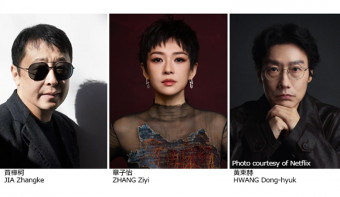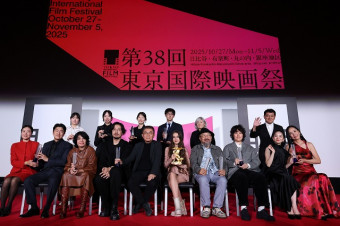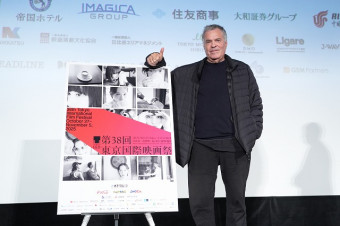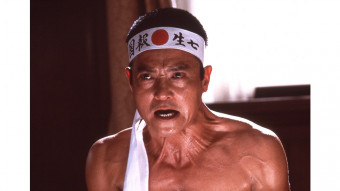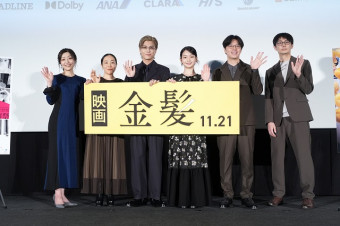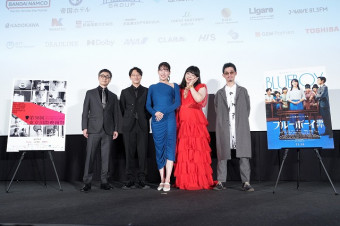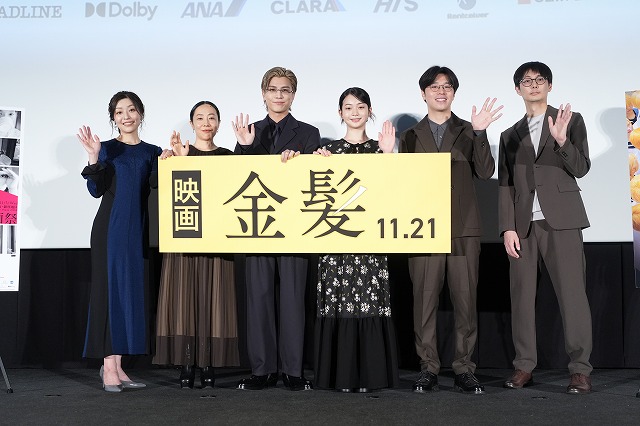
The Japanese comedy Blonde had its world premiere at the 38th Tokyo International Film Festival in the Competition section, and at a screening on November 4, the director and several members of the cast showed up to greet the sold-out audience. Based on the response from the crowd, most of them were there to see lead actor Iwata Takanori, who plays a character that is contrary to his usual type.
“Thanks for coming to the screening,” he said right at the beginning. “I play the protagonist, so I dyed my hair blonde for the occasion, though it’s a lie.” After the audience acknowledged this subterfuge with a wave of laughter, Iwata said, “I got the offer for this film two years ago, and I immediately said yes because of the screenplay, which does a good job of showing generational differences in Japan. For that reason, I think all generations can appreciate it in different ways.”
Iwata plays a middle school teacher at a school where some students protest the persecution of a classmate forced to dye her naturally brown hair black by dyeing their own hair blonde. The story is based on several news stories about Japanese schools where students must conform to appearance norms that go beyond dress codes. Iwata’s teacher ostensibly sides with the students out of a sense of generational sympathy, but eventually he rejects the students’ protest in order to save his job.
Shiratori Tamaki, who plays the rebellious student who sparks the protest, told the audience, “My character is a girl with inner strength. Before performing, I thought deeply about everything — how she would speak, how she would walk, how she would confront her teacher but having the blonde wig helped me get close to my own character.”
Tamura Kentaro complimented director Sakashita Yuichiro for working fast and “never making comments. But later, when you see the scenes he shot, it’s all complete, which proves how well he controls the movie.” Iwata chimed in with a joke: “Actually, yesterday was the first time I heard his voice.”
Uchida Chika, who plays a teacher, revealed that she’d worked with Sakashita before. “He makes comedy movies, but comedy with a social twist,” she said. “He’s very honest about how teachers in Japan are not that grown up. It’s often difficult to know what he’s thinking because he never smiles, but sometimes you’ll catch him grinning in front of the monitor.”
In accordance with the image just presented by his actors, Sakashita had little to add to the introduction. “This film is about school rules, which aren’t something close to me. The main character, in fact, is closer to me in terms of my feelings.”
Following the screening, both Sakashita and Iwata returned to answer the audience’s questions, which were mostly addressed to Iwata, an actor who normally portrays “cool” characters, but in this case depicts a decidedly uncool member of the establishment.
“I didn’t really think about it that much,” he said, when confronted with the change in image. “I just went with the flow and that’s what they captured, but it makes me happy that you never saw me like that before. I credit the director with pulling that performance out of me. We didn’t always understand each other, but it was he who made me create that character.”
For sure, the teacher Iwata plays is something of a jerk, a person who, thanks to his position of authority, feels he automatically knows what’s best, even if he can’t honestly answer his students’ questions about why they have to conform to arbitrary rules set for the sake of social conformity. He admits that he felt the same way they did when he was their age, but can’t convincingly explain why these rules are necessary except to say that the students aren’t mature enough to question them.
Sakashita compared the situation for Japanese teachers with the situation for workers in the film industry. “When you’re working on a set, you often feel that the environment isn’t that good,” he said. “Especially with regards to pay. It’s gotten better over the years, but it should still be better.”
Iwata added, “We live in a Japanese society where it is still important to respect elders but sometimes seniority is too much, because young people cannot talk to older people. We always have to work through filters. We should be able to communicate on a more equal level, whether socially or in our work situations.”
This aspect is addressed in the story when Iwata’s character conspires with the rebellious student to bring attention to social media to students’ rights and the gambit backfires on both of them. “I think the film treats my character in an interesting way,” said Iwata. “I’ve been acting for many years and the younger actors I’ve worked with are respectful to me, but it’s something that the film looks at differently.”
When another audience member asked for advice as to how she should approach her upcoming school exam, Iwata was blunt. “I don’t want to sound arrogant, but don’t think about failure. Don’t worry about not having enough time to study. If you’re a student, you can learn a lot by making mistakes. In general, there’s no such thing as failure in life.”
Greetings from the Stage and Q&A Session: Competition
Blonde
Greeting from the Stage: Sakashita Yuichiro (Director), Iwata Takanori (Actor), Shiratori Tamaki (Actor), Yamada Maho (Actor), Tamura Kentaro (Actor), Uchida Chika (Actor)
Q&A Guests: Sakashita Yuichiro (Director), Iwata Takanori (Actor)



























